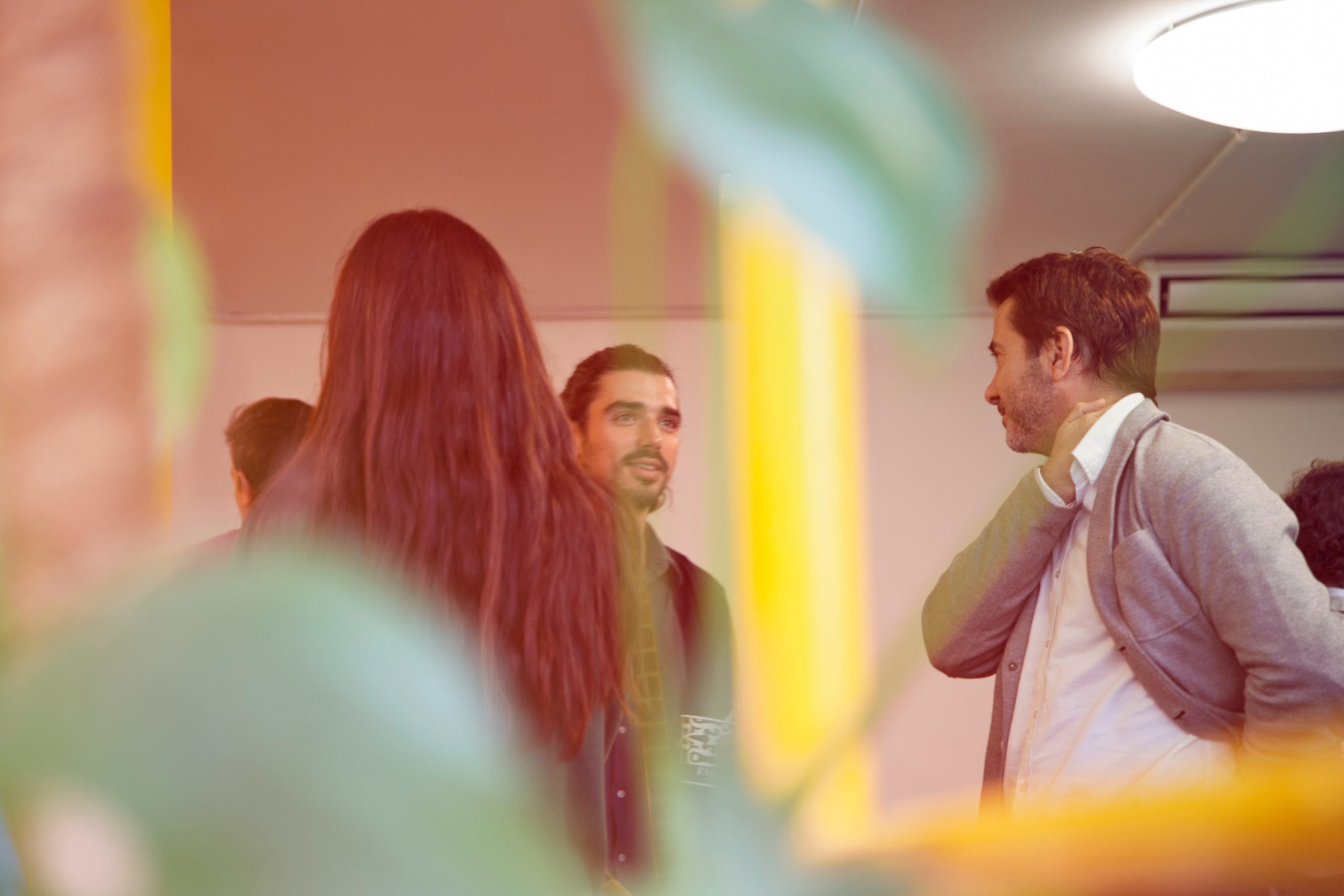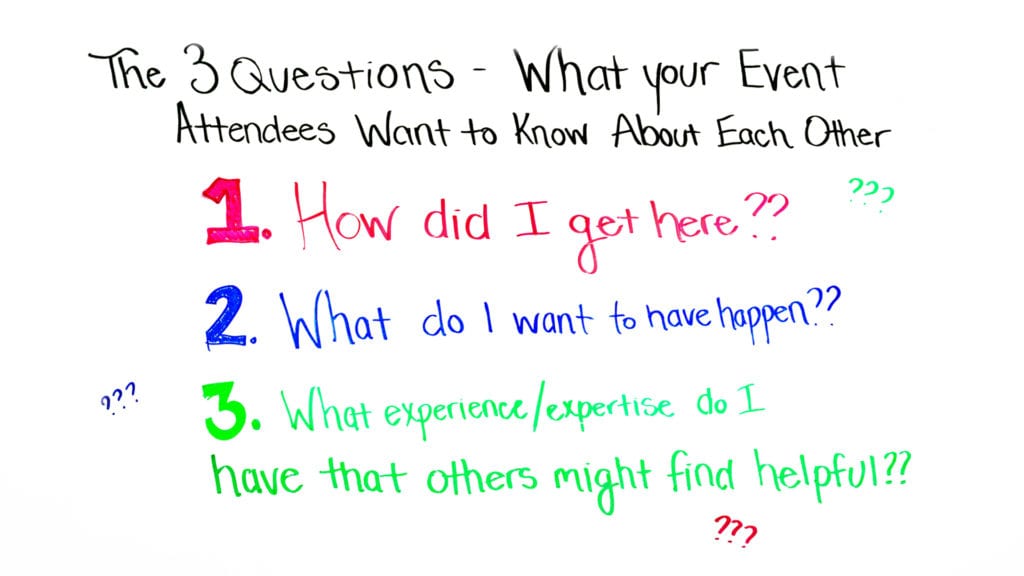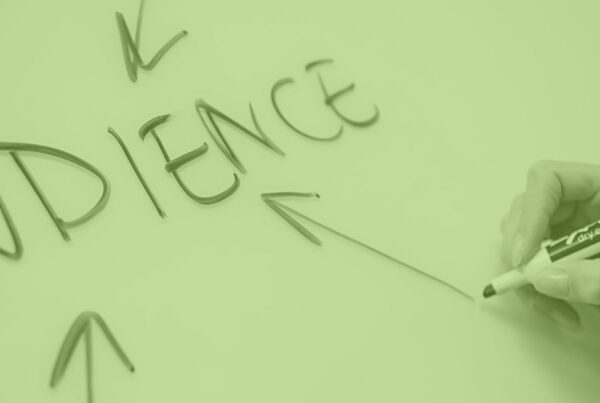Everybody gather ’round because we’re talking attendee questions that matter! So, when you’re putting an event together, what is the most important thing on your mind? Who are you doing this for? And who will ultimately decide the success of your event? Obviously, the answer is your attendees. And if there is one thing they look for in a meeting or conference, it’s a connection. Because at the end of the day, that’s what it boils down to for the people who attend your event – networking.
So we brought in an expert to help you! We’re very happy to introduce our amazing guest of today, Adrian Segar of Conferences That Work. Over the years, Adrian has developed something he calls the three questions. And these are some of the only attendee questions that actually matter. So jump right in, it’s time for another Whiteboard Wednesday!
The 3 Attendee Questions: What They Want to Know About Each Other – Video Transcription
Welcome to another Whiteboard Wednesday. I’m Adrian Segar, of Conferences That Work. I design and facilitate meetings that become what the people who come to them want and actually need them to be.
Attendee Questions: The Very Begining
So, I want to tell you a story about how this all got started. 27 years ago, I came into a room with about 40 other people and this was at the birth of the personal computer. The personal computer had just been invented and was finally affordable by small schools. I was working in IT at the time, doing IT at a small school. So, I went to the president of the school and said, “Hi, you don’t have to keep information on three by five cards anymore. There’s this thing called a database.” And the president said, “Wow, would you like to put these things together?” I said, “Sure.” And I organized a conference.
A Trip Down Memory Lane
I knew that there were other schools, small schools all over the country where this was going on and three of us actually put this conference together. So imagine the scene. You’re in this room, I’m in this room with people. And I had been organizing conferences for quite a number of years in other fields and they were conventional. You invited the experts to come. And this was the first time when we put this together, it was like there are no experts. We the people who come here who are doing this for the first time, this brand new thing, we are the experts. So, how do you build a conference? What kind of model do you have? We don’t even know each other. We don’t know what we know, we don’t know what our issues are, etc.
The 3 Attendee Questions Emerge
And so I sort of on the spot put together something that over the years, over the next 10 years, I developed and refined into something that I’m calling the three questions. And that’s what I’m going to tell you about today. It’s turned into a fundamental technique that I use that I think every meeting where the meeting organizers want people to actually discover the other people who are valuable to them, in other words, make connections. This is the best technique I know for doing this. You do it at the start of the event. If you haven’t seen my Whiteboard Wednesday video on the conference arc, this is the first thing that happens at the beginning of the conference arc. And it’s one of the techniques that you can use when you’ve got a day and a half or longer conference for people to actually really connect very early on about the things that are important.
Let’s talk about the three attendee questions because the three attendee questions are really about what people at meetings actually want to know about each other. And this whole process, the three questions is a way for people to hear, get that information in a structured way. And in an interesting way, and in a way that really builds a collection, a sense for the whole group of what people at the event actually want to do and actually want to talk about. What’s important to them. Plus, the resources in the room that can make that possible. The actual mechanics of this again are described in more detail in my books and on conferencesthatwork.com, my website.
The Process Behind The Three Attendee Questions
But in essence, what happens is these three questions are given to each person on a card. Writing in this is actually important and everyone gets a pen and up to about a maximum of about 60 people will do this as a single group. If you’ve got 500 people you might take 10 groups of 50 people. And this is happening in 10 different rooms simultaneously with those groups of 50 people.
Number One
Let’s go through the questions and I will try to explain how these questions actually answer the core things that you want to know when you meet someone. A stranger, you don’t know anyone about at a meeting and you know that you have something in common with them. Because you’re all there because the meeting is about whatever it’s about. Here’s what you need to know. The first question of the three attendee questions is, number one is, how did I get here? When people answer these questions, because what happens is after they’ve written down their answers, they take turns to take a minute or two to share their answers with the entire group of 50, 60 people, or however many people it is.
No Wrong Answers!
What I tell people before they do that is you cannot answer these questions incorrectly. So it’s perfectly okay to say, “I flew in on an American Airlines flight into Phoenix Airport and took an Uber here.” That’s a perfectly reasonable answer to, how did I get here? But also of course, I mean if someone’s a repeat attendee at an event that’s been going on you might say, “I’ve been coming here for six years. And my friend so and so or my boss told me this is a great conference. I should come.”
Or you might say, “My boss tells me I have to go to this event.” Whatever it is. And you also at this point give your name and affiliation, where you’re from. So you get, you’re providing some information about the past context of this. Who this person is, what their affiliation is, which may mean something. I work for company X or whatever, and my connection to this event. Why am I in this room? That’s what this question is about. And again, there are no wrong answers. If you have people say, “My boss told me I had to come.” You can’t really argue with the boss. But you’re going to get some information here.
Number Two
But actually it’s the second and third questions that really give the power of this exercise. The second question is, is what do I want to have happen? What this is about is – you’re saying, suppose this conference could be anything I wanted it to be. I could completely control what would happen here, what would make this conference amazing for me? Because when you come to a conference, whenever you go to a meeting of any kind, you’ve got questions. You’ve got things that you, there are problems you’re wrestling with. There things that you’ve heard about that you want to learn more about.
The answer to this attendee question is the opportunity that you have to the 50, 60 other people or 30, whatever it is, the number of people in the room, to tell people, “This is what I would like to do at this conference. If I could get some answers to this question, that would be fantastic. And I really want to talk about subject Y.” Whatever it is. You share that, and of course, you’re hearing that from all these different people at the group. There’s some resonance then and it’s incredibly common to discover that there are some topics that may be the conference organizers never even thought about. And that are on the mind of a lot of people. Well, then you can create a conference. Again, that’s described a little more in my other video on, the conference talk that actually meets those needs. Those needs that are just being found at the moment.
That’s A Lot Of Topics!
This attendee question gets answered, and what we also do while this is going on, is you’ll have a scribe. In the old days we used to use flip charts. These days is usually a projected Google doc on the wall and scribes are writing down the answers to this question. So you’re getting a big list of possible topics and the whole group is seeing topics that are obviously important. People will often say later, “Yeah. I’m also really interested in that.” Or they say, “Well, I have a slightly different take on this particular topic. This is what I want.” And you’re getting all this information out.
Number Three
And then the third attendee question is a really important question. What experience expertise do I have that others might find helpful? This is a great question. Because this is where you’re uncovering the incredible expertise in the room. David Weinberg said that the smartest person in the room is the room. In other words, when we capture and can use all the experience and expertise in the room as appropriate, we’re really maximizing our access to the resources, the tremendous resources.
One of the things I often do at conferences is have people line up an experience line. You have a hundred people in the room and you say, “Line up by the number of years you’ve been in this industry.” And you might find that the average is 10. Which means you’ve got a thousand years of experience in the room. And these conferences tap that. These are peer conferences and they tap that.
Uniting The Three Attendee Questions
This question, question two, just to go back for a moment. This question is about the present. And this was about kind of about the past. This is where I came from. And this is what I want right now. This is about the past, the experience, and expertise. But also about the future because this will also drive this. These are the resources that we need to actually answer these questions in the future for the rest of the conference that’s going on.
The three attendee questions uncover a huge amount of information. There’s always some surprises there. And there’s always the person that basically talks about something that they’ve done that people are really interested in. Something that no one, the conference organizers, sometimes the person themselves have no idea that anyone is interested in. That they have done something of value. Of course, you have your turn to do this. And maybe people are really interested in what you have to say. And maybe you’ll find out you’ll be leading a session later in that conference.
Understanding The Impact
But that’s the exercise essentially. And you can run it in an hour, an hour and a half. And it takes some time. But it’s one of the most important things you can do. Because even inside that group of 50, 60 people, you might discover, if you discover the one person in those 50, 60 people that are like, “This person can help me. This person, I can work with this person. We can collaborate. This is a great sales prospect for us. We have a perfect match here.” That’s incredibly valuable. And that’s not going to happen at a traditional event unless you happen to sit next to that person at lunch. Whereas the person who’s three chairs away, maybe the person who you really should have met, and you would meet through this process. But you’re never going to meet them at a traditional event.
Conclusions
That’s the three attendee questions, a very simple process. And again, you can read about exactly how to do it in my books. The questions I guess that I have for you is, you may have some questions about how you use this. You may have some questions about, for example, why do you write things down? Why is that important? If you have questions about how to run the three questions, put them in the comments and I will answer those questions for you.
And while you’re writing that in those comments, don’t forget to subscribe to Whiteboard Wednesday, so you won’t miss any more of these entertaining little videos. I’m Adrian Segar of Conferences That Work. And until next time, goodbye from Whiteboard Wednesday.
Resources
Our Event Industry Conference Attendee Strategies
Make Event Networking Better For Your Attendees
Improving Your Attendee Experience: Design Thinking For Events
Conference Networking: How to Help Attendees Make Meaningful Connections
Attendee Strategies That Matter: How to Help Your Attendees Find Their Tribe
How To Create The Ultimate Event Layout Attendees Will Fall In Love With











